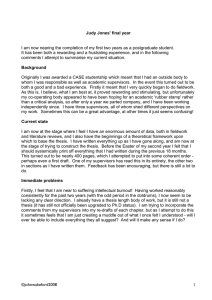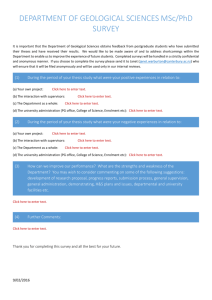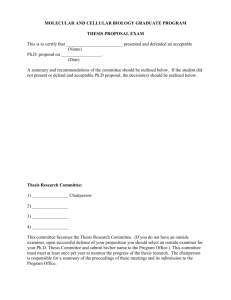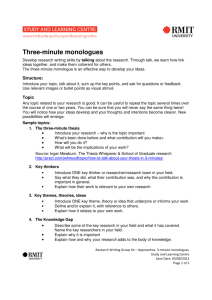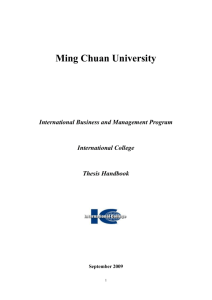Writing a Research Proposal
advertisement
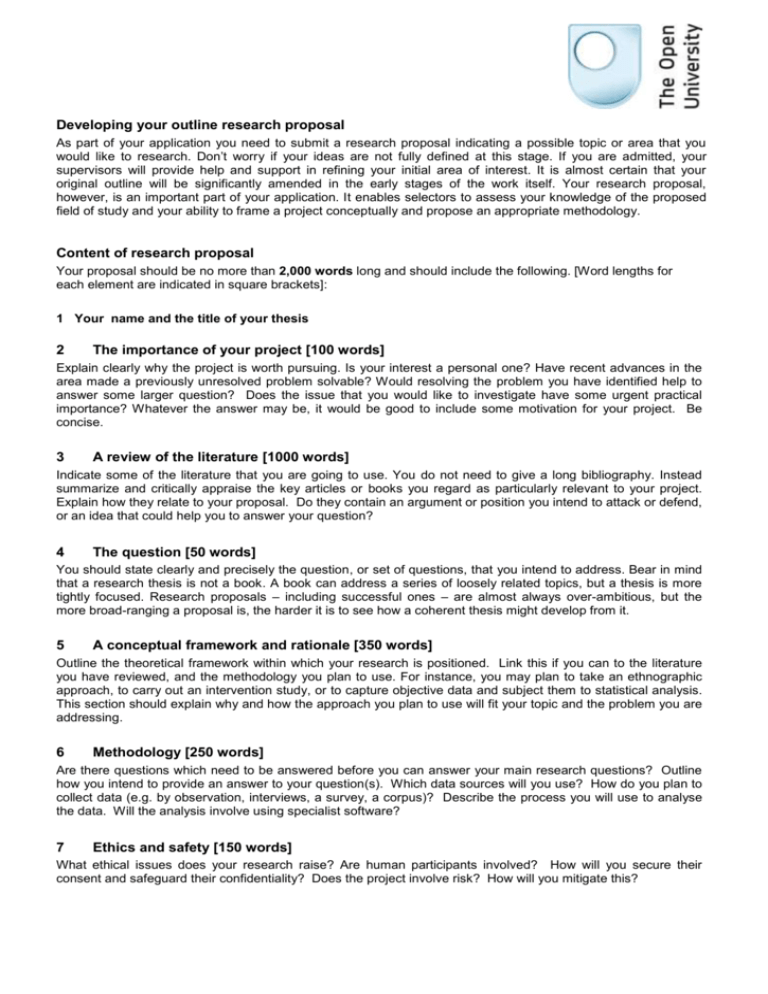
Developing your outline research proposal As part of your application you need to submit a research proposal indicating a possible topic or area that you would like to research. Don’t worry if your ideas are not fully defined at this stage. If you are admitted, your supervisors will provide help and support in refining your initial area of interest. It is almost certain that your original outline will be significantly amended in the early stages of the work itself. Your research proposal, however, is an important part of your application. It enables selectors to assess your knowledge of the proposed field of study and your ability to frame a project conceptually and propose an appropriate methodology. Content of research proposal Your proposal should be no more than 2,000 words long and should include the following. [Word lengths for each element are indicated in square brackets]: 1 Your name and the title of your thesis 2 The importance of your project [100 words] Explain clearly why the project is worth pursuing. Is your interest a personal one? Have recent advances in the area made a previously unresolved problem solvable? Would resolving the problem you have identified help to answer some larger question? Does the issue that you would like to investigate have some urgent practical importance? Whatever the answer may be, it would be good to include some motivation for your project. Be concise. 3 A review of the literature [1000 words] Indicate some of the literature that you are going to use. You do not need to give a long bibliography. Instead summarize and critically appraise the key articles or books you regard as particularly relevant to your project. Explain how they relate to your proposal. Do they contain an argument or position you intend to attack or defend, or an idea that could help you to answer your question? 4 The question [50 words] You should state clearly and precisely the question, or set of questions, that you intend to address. Bear in mind that a research thesis is not a book. A book can address a series of loosely related topics, but a thesis is more tightly focused. Research proposals – including successful ones – are almost always over-ambitious, but the more broad-ranging a proposal is, the harder it is to see how a coherent thesis might develop from it. 5 A conceptual framework and rationale [350 words] Outline the theoretical framework within which your research is positioned. Link this if you can to the literature you have reviewed, and the methodology you plan to use. For instance, you may plan to take an ethnographic approach, to carry out an intervention study, or to capture objective data and subject them to statistical analysis. This section should explain why and how the approach you plan to use will fit your topic and the problem you are addressing. 6 Methodology [250 words] Are there questions which need to be answered before you can answer your main research questions? Outline how you intend to provide an answer to your question(s). Which data sources will you use? How do you plan to collect data (e.g. by observation, interviews, a survey, a corpus)? Describe the process you will use to analyse the data. Will the analysis involve using specialist software? 7 Ethics and safety [150 words] What ethical issues does your research raise? Are human participants involved? How will you secure their consent and safeguard their confidentiality? Does the project involve risk? How will you mitigate this? 8. Hypothesis [100 words] At this stage you will not be able to give the answer to your research question/s. But you may already have a hunch about what it is likely to be. If so, state it briefly here, in the form of a hypothesis. If not, omit this section. 9. References List the publication details of all the works you have referenced in your proposal. Use a standard referencing format (e.g. Harvard). This should help us to understand the literature you are familiar with. The reference list is not included in the word count. Additional information As indicated above, your project is likely to develop under the guidance of your supervisors. You are not committed to everything that you say in your proposal; only to producing the thesis that develops out of it. Please do not worry if you do not know exactly how your thesis will develop: you can signal areas you are uncertain about, or try out a particular line that may be modified later on. If you are awarded funding for your PhD from an external body, you may be requested to adapt your proposal in line with its requirements. Your supervisors will provide support and guidance in this event.


